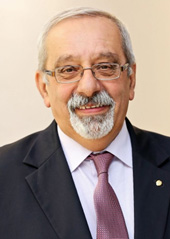 |
prof. zw. dr hab. dr hc. Bogusław Buszewski, czł. rzecz. PAN Bogusław Buszewski jest specjalistą z zakresu chemii analitycznej i chemii fizycznej. Studia wyższe ukończył na Wydziale Matematyki-Fizyki-Chemii Uniwersytetu Marii Curie-Skłodowskiej (UMCS) w Lublinie. W 1986 r. otrzymał stopień doktora na Wydziale Technologii Chemicznej Słowackiego Uniwersytetu Technicznego w Bratysławie. W 1992 r. uzyskał stopień doktora habilitowanego, a w 1994 i 1999 r. otrzymał tytuł naukowy profesora chemii i prof. zwyczajnego. Był stypendystą Fundacji Alexandra Humboldta w Instytucie Chemii Organicznej na Uniwersytecie w Tybindze w jak również wielu innych stypendiów w uznanych ośrodkach naukowych. Zainteresowania naukowe prof. Buszewskiego związane są z chemią analityczną, medyczną i środowiska jak też fizykochemią zjawisk powierzchniowych oraz z zastosowaniem chromatografii i technik pokrewnych. Zajmuje się również metodami przygotowania próbek, spektroskopią i chemometrią. Jest autorem i wsółautorem ponad 770 publikacji 58 patentów i licznych wykładów na zaproszenie. Należy do grona najczęściej cytowanych polskich chemików (ponad 20000 cytowań, h = 62). Promotor 45 doktoratów i opiekun 23 zakończonych habilitacji. Pięciu jego uczniów jest profesorami tytularnymi. Za liczne zasługi Profesor był wielokrotnie wyróżniany w kraju i za granicą, m.in. Złotym Krzyżem Zasługi, Krzyżem Kawalerskim i Oficerski Orderu Odrodzenia Polski Polonia Restituta, Medalem Komisji Edukacji Narodowej, Medalem prof. W. Kemuli, Złotym Medalem Słowackiego Towarzystwa Chemicznego i Mołdawskiej Akademii Nauk oraz nagrodami, m.in. Prezesa Rady Ministrów, Ministerstwa Nauki i Szkolnictwa Wyższego, Ministra Zdrowia, Fundacji Humboldta, EuCheMS Award, Naczelnej Organizacji Technicznej, PTChem oraz subwencji profesorskiej Mistrz Fundacji na Rzecz Nauki Polskiej czy Nagroda PAN im. M. Skłodowskiej Curie. Prof. Buszewski uhonorowany został godnością profesora honorowego Uniwersytetu Przyrodniczego we Wrocławiu, oraz doctora honoris cause w pięciu ośrodkach akademickich w kraju i za granicą. Sprawował funkcję prezesa Societas Humboldtiana Polonorum, prezesa Polskiego Towarzystwa Chemicznego i prezydenta European Society for Separation Science (po dwie kadencje). Był członkiem Centralnej Komisji ds. Stopni i Tytułów (dwie kadencje). Aktualnie jest vice-przewodniczącym Rady Doskonałości Naukowej i przewodniczącym Komitetu Chemii Analitycznej PAN oraz przewodniczącym Central European Group for Separation Sciences. Jest również członkiem rzeczywistym PAN i Europejskiej Akademii Nauki i Sztuki. |
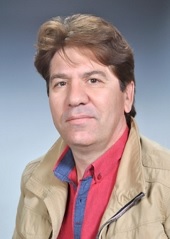 |
prof. Valentin Mirceski Valentin Mirceski is full professor at the Institute of Chemistry, Faculty of Natural Sciences and Mathematics, University “Ss. Cyril and Methodius” in Skopje, R. Macedonia. Currently he is affiliated with the Lodz University in Poland as well. He has a broad scientific interest in the area of electrochemistry, in particular electroanalysis, theoretical and experimental studies of electrode mechanisms and kinetics, theory of square‐wave voltammetry, electrochemistry at liquid interfaces, electrocatalysis, development of novel electroanalytical techniques etc. He has published more than 120 articles, with a Hirsch factor h = 31, ranging him among the most cited scholars from Macedonia. He is an author of the monograph Square‐wave voltammertry: theory and application, as well as one of authors of the Dictionray of Electrochemistry published by Springer. According to the analysis of global scientific achievements published by the Stanford University in 2020 and 2021, Mirceski is ranged within 2% most influential scientists globally. |
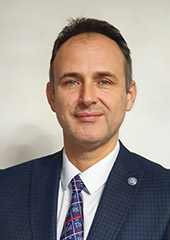 |
prof. Levent Pelit Assoc. Dr. Levent Pelit graduated from Ege University, Faculty of Science, Department of Chemistry in 1998, and completed his master's and then doctoral studies at the Institute of Science, Analytical Chemistry Department of the same university in 2009. Since 1999, he has been working on the development of electroanalytical, spectroscopic, and chromatographic methods in the Chemistry Department of the Faculty of Science and continued his duty as a faculty member after receiving the title of associate professor in 2015. He has been involved in the field of analytical separation science, with special emphasis on modern sample preparation approaches, mainly in innovative sorption-based microextraction techniques. His main basic scientific research areas include the development of analytical methods for the determination of biomarkers for the diagnosis of diseases and the monitoring of environmental pollutants in different matrices. There are many projects, patent applications, and 27 publications involving translational studies on analytical chemistry and separation science. |
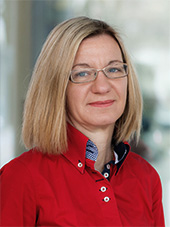 |
prof. Polonca Trebse Polonca Trebše is professor of chemistry at the University of Ljubljana, Faculty of Health Sciences. She graduated in Chemistry in 1990 at the University of Ljubljana, Faculty of Chemistry and Chemical Technology, where she obtained her Master degree in 1994 and PhD 1997 in the field of organic synthesis. |
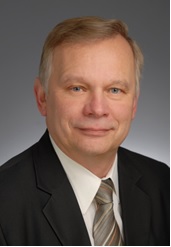 |
Dr. Joachim P. Weiss After his graduation in chemistry in 1979 from the Technical University of Berlin (Germany) he worked in the field of Liquid and Gas Chromatography at the Hahn-Meitner-Institute in Berlin and received his Ph.D. in Analytical Chemistry in 1982 from the Technical University of Berlin. In 2000, Prof. Guenther Bonn appointed him Visiting Professor at the Leopold-Franzens University in Innsbruck (Austria). Weiss habilitated in Analytical Chemistry at the Leopold-Franzens University in 2002. In 2011, 2014, and 2016, Prof. Jacek Namiesnik appointed him Visiting Professor at the Technical University of Gdansk (Poland). |
